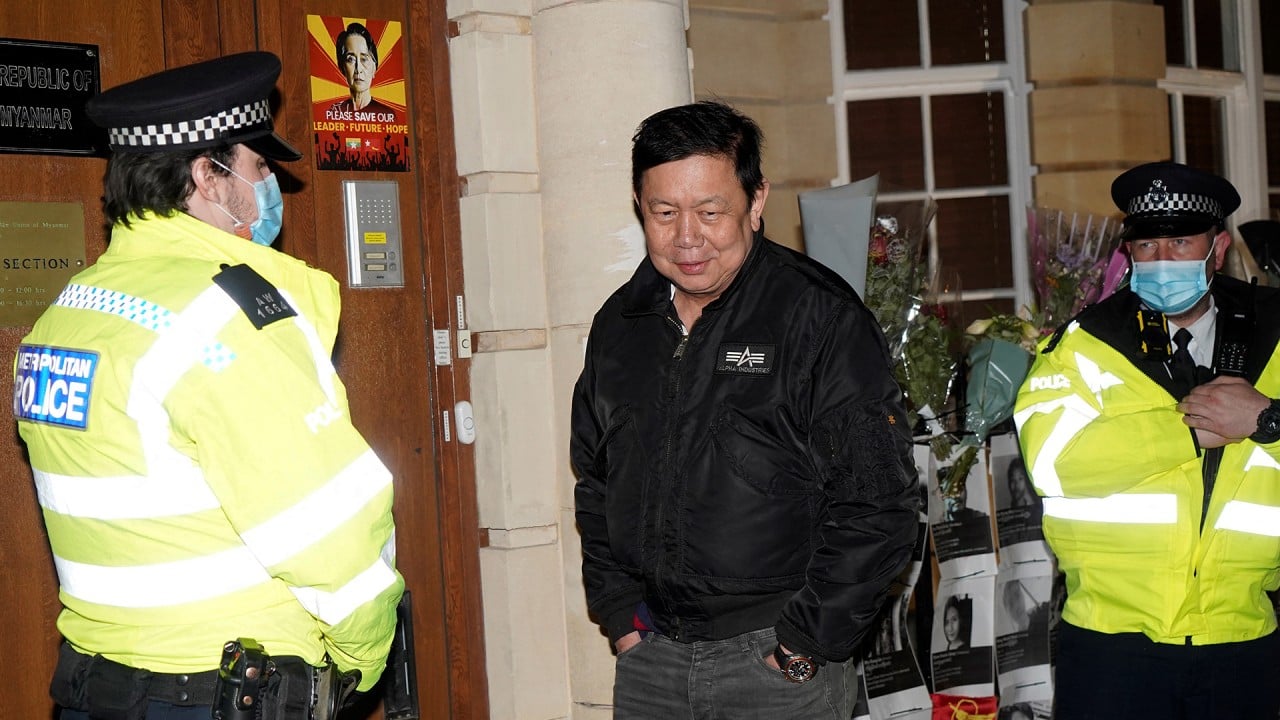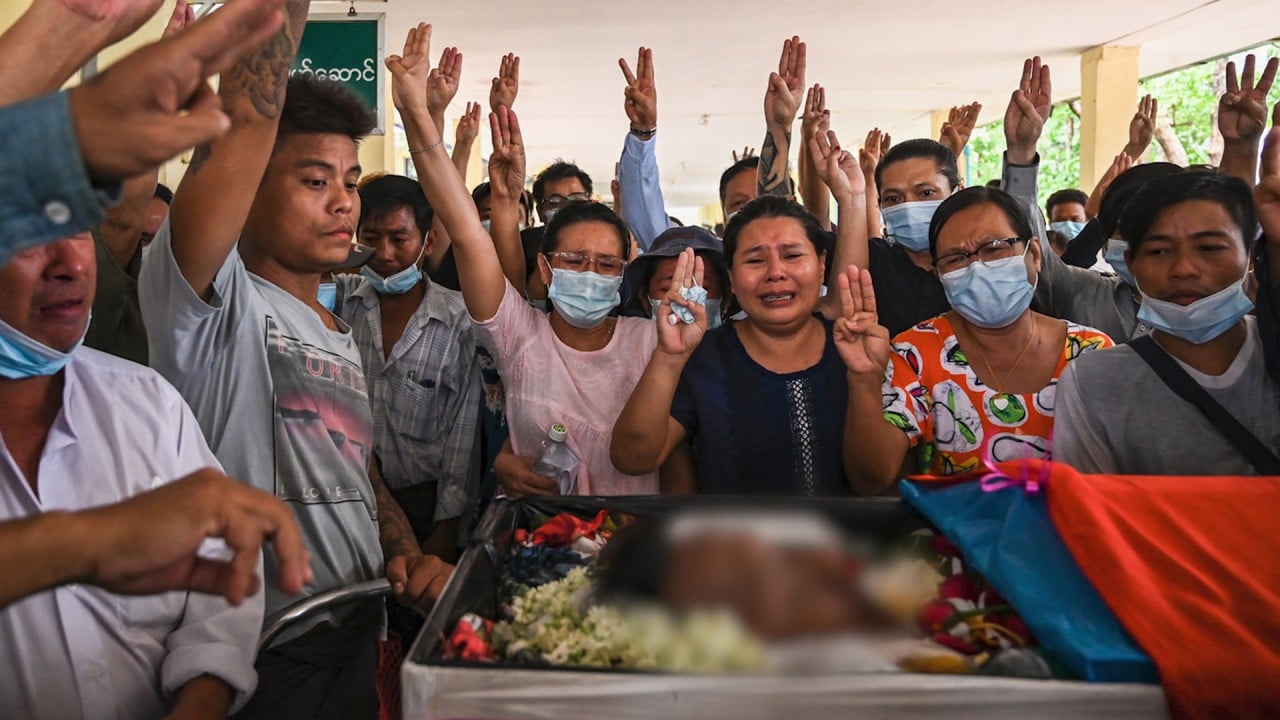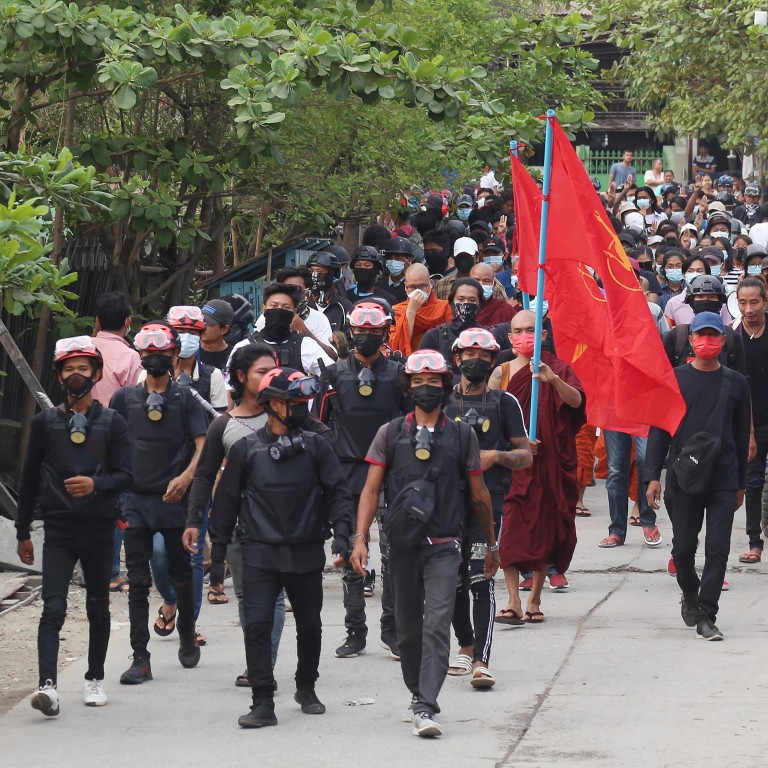
Myanmar crisis: leave or stay? Taiwan, Hong Kong expats among the foreigners counting the cost of doing business
- Foreign investors face pressure to suspend business with the junta while expat workers have left due to post-coup instability, including cash shortages
- Animosity towards Beijing in Myanmar has boiled over, leaving many Chinese nationals anxious that they will be targeted further after a spate of arson attacks on manufacturing plants
“The firm will be operated at minimal cost, with [day-to-day operations] entrusted to two staff,” he said.
His firm employs 15 staff but most have requested unpaid leave because they dare not commute to the office. He has continued to pay them a basic salary because the money could be “life-saving”, he said.
Myanmar coup: security forces kill 13 people as Chinese factory set alight in Yangon
Chen befriended more locals and his Taiwanese wife joined him in Myanmar. Their two children learned to speak Burmese from their nanny and kindergarten classmates. Even during last year’s Covid-19 pandemic, business remained relatively stable: an initial dip was followed by a boom when many of Chen’s competitors decided to leave the country.
“[In January] people were relatively optimistic,” Chen said. “The daily cases of Covid-19 dropped, and the [movement control] measures were gradually loosened. But the coup came.”
ANTI-JUNTA BACKLASH
Business activity has plummeted since the coup. The World Bank recently forecast Myanmar’s economy to contract 10 per cent this year, a drastic change from the 5.9 per cent expansion predicted in October. Fitch Solutions on Wednesday said the country was in danger of becoming a failed state.
“The escalating violence on civilians and ethnic militias shows that the Tatmadaw [the military] is increasingly losing control of the country,” it said, adding that the vast majority of nationals supported Suu Kyi’s ousted government.
The death toll from the post-coup crackdown last week passed 600 and about 3,000 people have been detained, according to the Assistance Association for Political Prisoners. As a result, multinational corporations face increasing pressure to suspend business with the junta.
Myanmar coup: death toll passes 600 as crackdown continues and security forces detain celebrities
Japanese beer giant Kirin, Australia’s Woodside Petroleum, French electricity utility firm EDF and German banknote printer supplier G+D have already said they will suspend business with military-linked corporations.
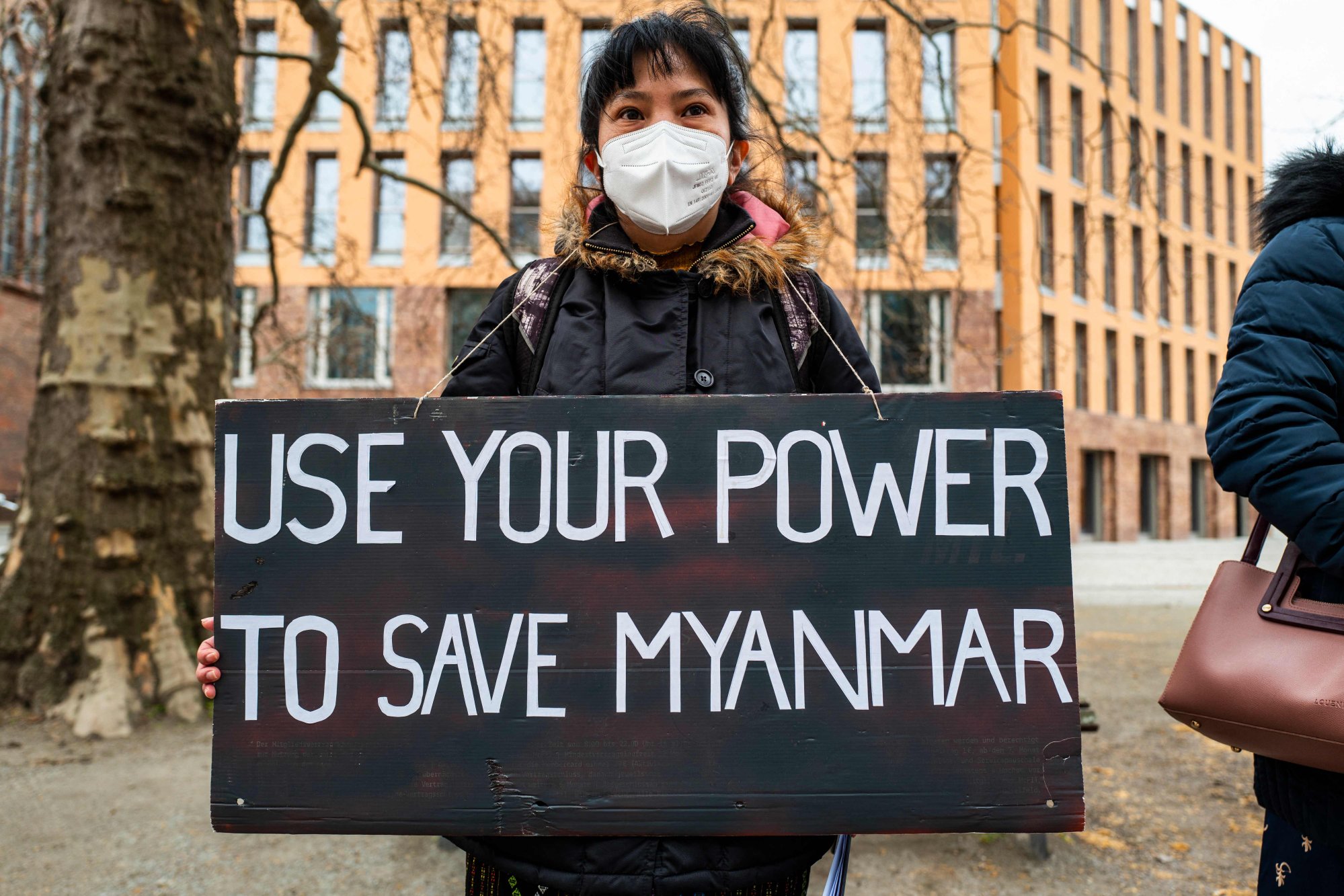
MASS EXODUS
“Most expats in my company left after the last week of February and worked remotely instead,” said one senior financial professional employed by a major e-commerce firm. “Only those who are married to locals have stayed.”
China can return stability to Myanmar and fix its image problem if it takes sides in the crisis
According to a manager at a telecommunications equipment supplier, maintenance staff were interrogated by police for carrying safety helmets on their truck, and their office in Yangon was raided by patrols searching for fleeing protesters.
The riots [in mid-March] broke the heart of many [Chinese]
Animosity towards Chinese businesses has nonetheless boiled over, manifesting last month through arson, robbery and vandalism at dozens of manufacturing plants in parts of Yangon. Most of the factories were linked to Chinese investment but plants owned by Taiwanese, Japanese and Myanmar locals were also damaged. Last week, a Chinese-owned factory in Shwepyithar was set ablaze, and activists in another neighbourhood burned a Chinese flag.
According to one Asian entrepreneur familiar with the Chinese business community in Yangon, “the riots [in mid-March] broke the hearts of many [Chinese]”.
“After the incident, the Chinese have moved to smaller WeChat groups,” the entrepreneur said. “They warned one another not to publicly speak up or post messages and photos in large WeChat groups.”
Some Chinese who used to work in the industrial zones moved to downtown hotels, including hotels owned by Europeans or Americans, for fear accommodation operated by Chinese could be targeted.
CASH IN SHORT SUPPLY
Businesses have also been constrained by cash shortages caused by temporary closures of bank branches. In early February, foreigners and locals alike rushed to transfer funds abroad but such transactions became more difficult after bank staff joined the civil disobedience movement.
Chen, the Taiwanese entrepreneur, has not used his corporate account since February 1, the day of the coup. He did not withdraw cash in the first week of February and by the time he realised the turmoil might continue for weeks or months, it was too late.
“Each bank branch hands out 20 or a very limited number of tokens every day,” he said. “The bank only serves those with a token. People have to queue in front of the branch as early as 3am. There are long queues in front of every ATM too, and the machines are often empty.”
Importing funds also takes longer. Incoming transactions are subject to review by the Central Bank of Myanmar; before the coup, the process took about a week, but it now takes several weeks.
“[When the transaction is under review,] you don’t know where your money is,” said one employee of a Mandalay industrial estate who assists foreign investors. “The protracted process is horrific for investors.”
The temporary closure of banks and disturbances in seaborne logistics have multiplied financial challenges for manufacturing factories.
“Logistics disruptions have significantly interrupted production plans,” said Luo Muzhen, secretary general of Textile and Apparel Industry Branch, China Enterprise Chamber of Commerce in Myanmar (CECCM).
“Raw materials cannot arrive at factories in time. Order processing is delayed. Remittances of manufacturing fees from abroad cannot arrive and be withdrawn in time. This may lead to tensions or even a fracturing of the capital chain.”
Some manufacturing plants in industrial zones pay workers in cash because many employees, particularly those from remote villages, do not have access to financial services. The banking standstill has therefore created immense challenges.
One manager at an information technology hardware supplier in Yangon said his firm continued to pay staff via their bank accounts, making the bank a target of anti-junta protesters who criticised it for seeking to continue normal operations.
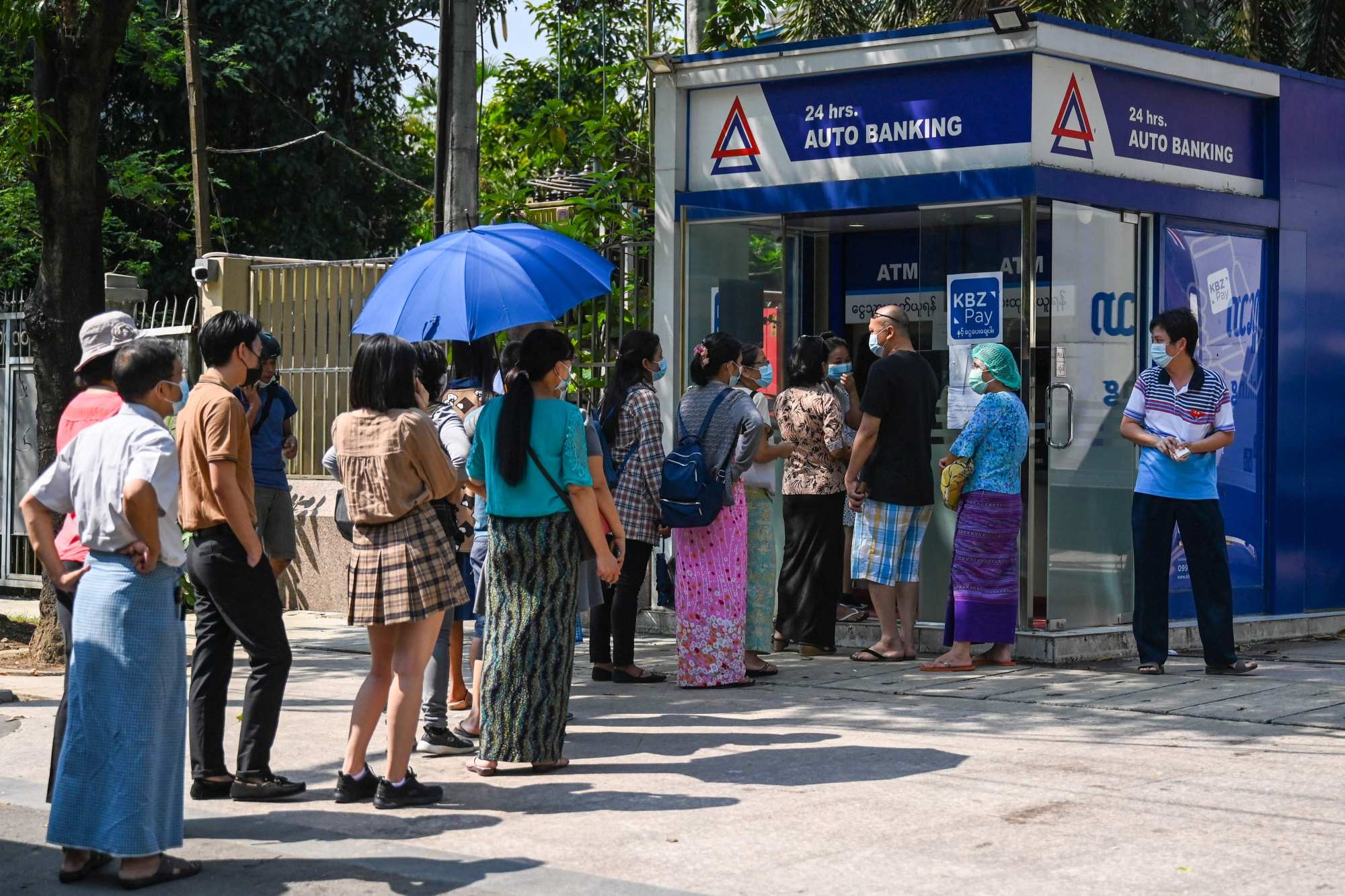
POST-COUP UNCERTAINTY
The military regime has sought to brandish its investment-friendly credentials but the backlash against the coup has created intense instability.
“Investors are more alert to the general political risks than any specific law that is passed at the moment,” said a foreign lawyer, who works at a regional law firm in Yangon. “We are seeing fewer investors and therefore clients as a law firm. We may be pressured to lay people off.”
Luo from the Chinese Chamber said divestments in the country’s garment industry – a significant employer, though the industry is smaller than in some neighbouring countries – had not yet occurred as most manufacturers were waiting to see how the political stand-off develops.
“In the face of political events, what foreign-invested enterprises can do is limited,” he said. “Cloth-making is an export-oriented industry. Without a return of client confidence in the Myanmar market, a lack of orders can be fatal to cutting, making and packing [CMP] plants.”
As some factories that completed their existing orders have closed temporarily, continued investment depends on the willingness of European brands to place further orders in Myanmar’s CMP factories, which in turn depends on the country’s stability and security.
Asean leaders to meet over Myanmar in Jakarta, bloc chair Brunei says
In the 2019-20 financial year, Myanmar’s garment industry surpassed natural gas as the country’s most lucrative export sector. The thriving industry employed about 500,000 workers, benefiting from tariff-free and quota-free access to the European Union, granted in return for Myanmar’s economic reforms that began in 2011.
In Myanmar’s largest agricultural export sector, the effects of the instability have already taken a toll. Myanmar is the world’s second-largest exporter of pulses, after Canada, and the produce is cultivated by about 3 million farmers. International pulse traders pay suppliers in Myanmar soon after signing a contract, an unusual supplier-friendly practice that dates back to the years when the previous junta was subject to US sanctions. According to an industry source, the arrangement has ensured millions of US dollars remain in Myanmar.
Since the military coup, though, international traders have reduced their pulse stocks and funds in Myanmar, signed fewer new contracts and offered less attractive terms, the source said.
After the coup, we can no longer predict anything
The source also said the pulse trade via seaborne transport that was terminated after the coup had since recovered to about 50 per cent of the pre-coup volume as private logistics firms resumed business, providing trains and trucks in the port area.
“But it is uncertain how long this will last,” the source said. “After the coup, we can no longer predict anything.”
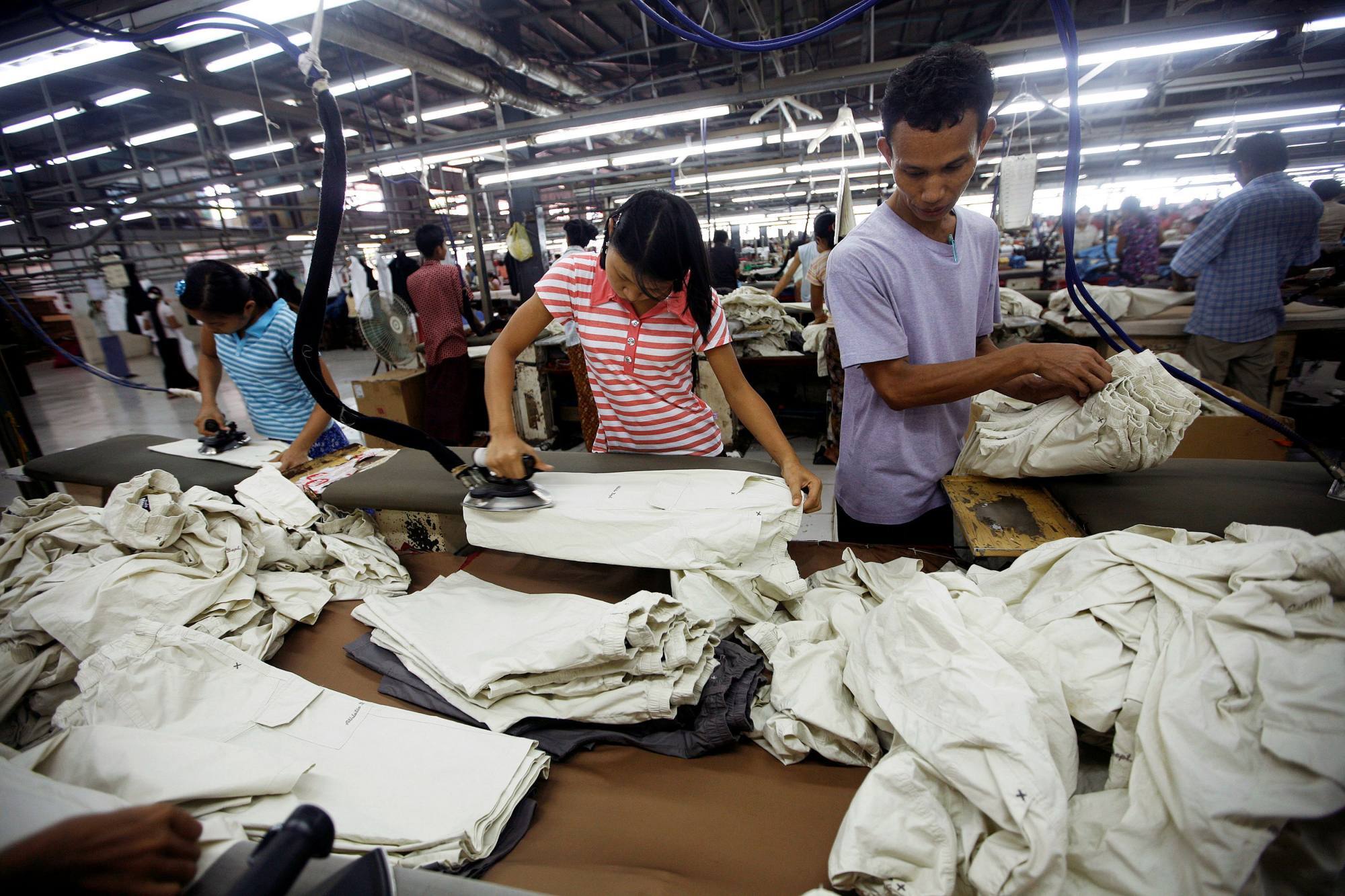
NO END IN SIGHT
For those with family in Myanmar, the choice to stay or leave has not been easy. Nor has it been exclusively about business.
Ran, a 33-year-old Chinese lawyer, works in Yangon and met his wife in Myanmar. Their infant daughter, who was born during the Covid-19 pandemic, does not yet have a passport. The protests paralysed the government office responsible for notarising Ran’s daughter’s birth certificate, which meant the infant could not obtain a travel document from Myanmar or China.
“The political changes and the civil disobedience movement have made life more difficult and less practicable,” Ran said. “You have no idea when [the regime] would shut off the internet completely or stop shops from opening. Most people are stocking up food at home and trying to keep a lot of cash on hand in case the banks go down.”
Even for those who have left Myanmar, watching from abroad has proved difficult.
“[We who live] overseas feel very impotent,” said Ian Liu, a 35-year-old Hongkonger who worked for a tech firm in Yangon.
He left the country last year due to a personal emergency but continued to work remotely. His cat remains lodged at a pet hostel in Yangon and he has in recent weeks been unable to pay for board after his bank’s mobile payment service stopped working.
He was furloughed last month but his wife, who was a civil servant in Myanmar, finally reunited with him in Taipei.
“We had not seen each other for nine months,” Liu said. “We will first take a rest before determining what to do next.”
Chen, the Taiwanese entrepreneur, said he had arranged for his children to attend school in Taiwan. “The [political turmoil] won’t reach an end in the short-term,” he said. “We generally think that it will last for another half year at least.”


